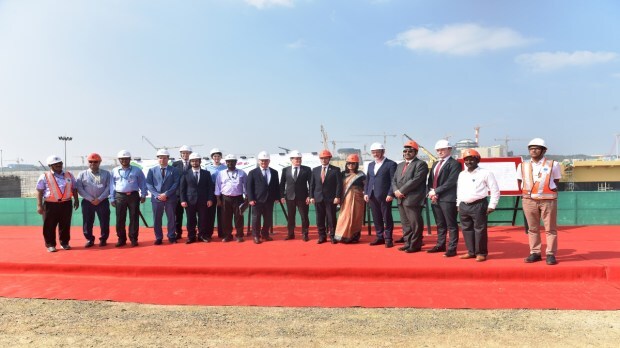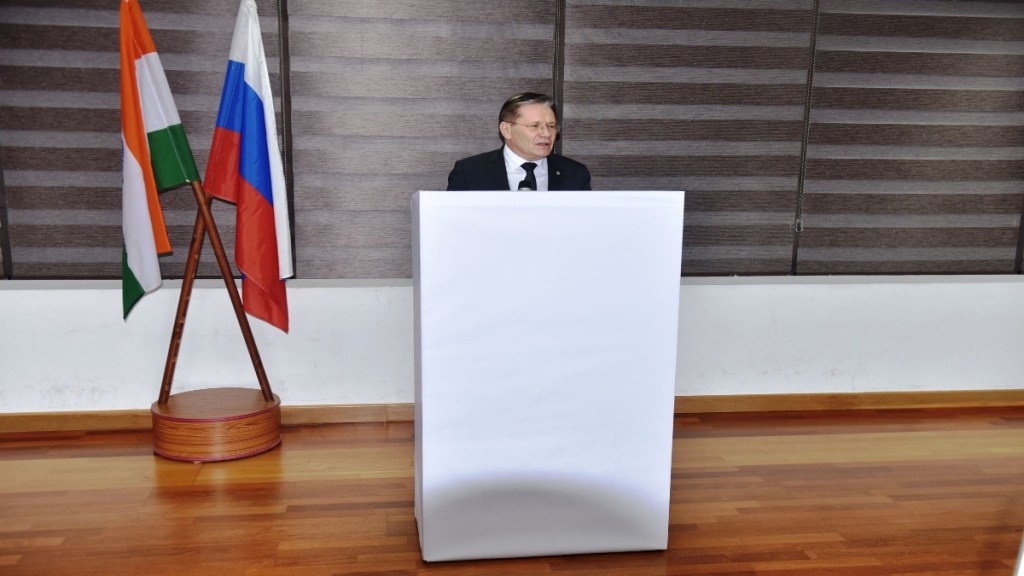A high-level delegation led by Alexey Likhachev, Director General of the Rosatom State Corporation and Ajit Kumar Mohanty, Chairman of the Atomic Energy Commission of India, Secretary of the Department for Atomic Energy have visited the construction site of the Kudankulam NPP in India.
Outcome of the visit
At the end of two-day visit Alexey Likhachev emphasized the strategic importance of India as a partner to Russia, highlighting the longstanding collaboration in nuclear endeavors dating back to the 1980s. He also commemorated the recent milestone achieved with the ten-year anniversary of the first power unit at the Kudankulam Nuclear Power Plant successfully connecting to India’s power grid. Expressing optimism, Likhachev affirmed the commitment to further advancing cooperative efforts in various aspects of nuclear energy utilization.
During the two-day visit, the delegation carefully examined the ongoing construction progress of the power units at the Kudankulam Nuclear Power Plant. They engaged in discussions regarding the long-term cooperation agenda between Russia and India in the field of nuclear energy. The outcome of these negotiations was the signing of a significant document known as the protocol, which supplements the intergovernmental agreement initially established in 2008 for the construction of power units for the Kudankulam Nuclear Power Plant.
Situated in the southern region of India within Tamil Nadu State, the Kudankulam Nuclear Power Plant represents a flagship project symbolizing the technological and energy partnership between Russia and India. Operated by the Nuclear Power Corporation of India Ltd. (NPCIL), the plant’s construction is overseen by Atomstroyexport JSC, with design contributions from Atomenergoproekt JSC and OKB Gidropress.
About the Project
The Kudankulam Nuclear Power Plant project envisages the installation of six power units equipped with VVER-1000 type reactors, collectively boasting a gross installed capacity of 6000 MW. Noteworthy achievements include the successful integration of Units 1 and 2 into India’s national power grid in 2013 and 2016, respectively, with both units surpassing nominal capacity expectations. Presently, construction activities are ongoing for Units 3 and 4, alongside preparations for the implementation of the third stage of the project.

In addition to constructing new power units, Rosatom, the Russian state corporation, facilitates the supply of dependable nuclear fuel for VVER-1000 reactors in India. Concurrently, efforts are directed towards enhancing the operational efficiency of these reactors through the adoption of extended fuel cycles and implementing advanced technological solutions.
The design philosophy underlying the Kudankulam Nuclear Power Plant reflects a progressive evolution in nuclear power plant engineering, emphasizing safety, reliability, and feasibility. Pioneering initiatives include the adoption of a unified system for cooling the condensers across the plant’s four units, optimizing water resource utilization. Furthermore, the innovative Open Top technology was employed for the installation of reactor plant equipment in Units 3 and 4, showcasing advancements in construction methodologies.
Committed to adhering to stringent safety standards prescribed by the International Atomic Energy Agency (IAEA), the new power units at the Kudankulam Nuclear Power Plant exemplify state-of-the-art engineering practices and robust safety protocols.
The Engineering Division of Rosatom serves as a hub for leading companies in the nuclear industry, overseeing a diverse portfolio of projects globally. Leveraging innovative technologies and expertise, the division specializes in providing comprehensive engineering, procurement, and construction (EPC) services for high-power nuclear power plants, emphasizing project management and design excellence.
With a predominant focus on international collaborations, the Engineering Division plays a pivotal role in advancing nuclear energy infrastructure worldwide, ensuring the delivery of safe, reliable, and sustainable energy solutions aligned with global standards and regulations.
In conclusion, the partnership between Russia and India in the development and operation of the Kudankulam Nuclear Power Plant epitomizes a successful synergy of technological expertise and cooperative diplomacy, fostering mutual benefits and contributing to the global advancement of nuclear energy utilization.


